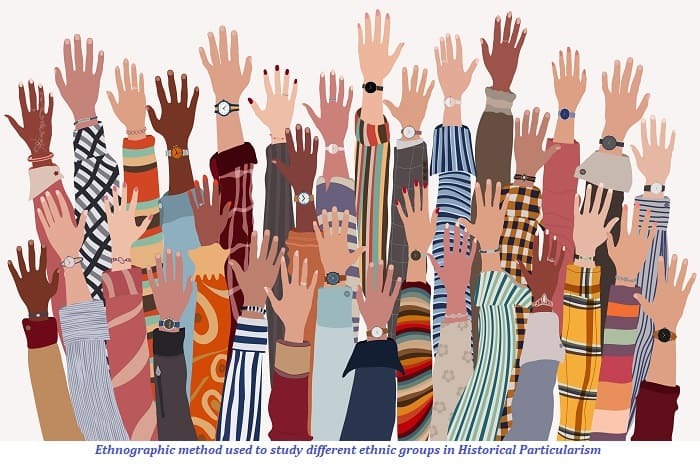

Historical Particularism emphasizes the unique historical circumstances and cultural particularities of a society. Diffusionism, on the other hand, is an approach that explains the spread of cultural practices and beliefs as the result of diffusion. Both approaches have been critiqued and revised over time, with contemporary anthropologists often taking a more nuanced and integrated approach that incorporates elements of both historical particularism and diffusionism.
It emerged in response to earlier anthropological approaches that sought to identify universal cultural patterns and laws. Instead, historical particularism suggests that each society has a unique history and cultural development, and must be studied in its own right. This approach stresses the need for ethnographic research and cultural relativism, as anthropologists must understand and respect the cultural beliefs and practices of the society they are studying.

Franz Boas is considered the founder of Historical Particularism in cultural anthropology. Boas was a German-American anthropologist who is known for his pioneering work in cultural relativism and cultural historical approaches to anthropology. He is often referred to as the "Father of American Anthropology."
Cultural Relativism − Boas was one of the first anthropologists to emphasize the importance of cultural relativism, the idea that cultural beliefs and practices must be understood and evaluated within their cultural context, rather than judged by the standards of another culture.
Historical Context − Boas emphasized the importance of understanding the unique historical circumstances and cultural particularities of a society to comprehend its cultural practices and beliefs. He encouraged anthropologists to study societies in their own right, rather than searching for universal cultural patterns and laws.
Empirical research − Boas was a strong advocate for empirical research and emphasized the need for anthropologists to use rigorous scientific methods to gather data and analyze cultural practices and beliefs.
Multiculturalism − Boas' work helped lay the foundation for the idea of multiculturalism, the recognition, and the celebration of cultural diversity in society. He believed that all cultures are equally valuable and deserving of respect, and encouraged anthropologists to study and understand a wide range of cultural practices and beliefs.
Historical Particularism, like all theoretical perspectives, has its limitations. Some of the main limitations of historical particularism are −
Narrow focus − Historical particularism can lead to a narrow focus on the unique cultural practices and beliefs of a single society, potentially ignoring broader cultural patterns and connections between societies.
Limited cross-cultural comparison − By emphasizing the unique historical circumstances and cultural particularities of each society, historical particularism can make it difficult to compare and understand cultural similarities and differences across cultures.
Incomplete understanding of history − Historical particularism often relies on historical records and ethnographic accounts, which can be incomplete and biased. This can result in an incomplete or inaccurate understanding of the historical context and cultural practices of a society.
Cultural essentialism − Historical particularism can also lead to cultural essentialism, the belief that a society has a fixed and unchanging cultural essence, rather than a dynamic and changing cultural landscape.
Despite these limitations, historical particularism remains an important approach in cultural anthropology, and continues to provide valuable insights into the unique cultural practices and beliefs of individual societies.
Diffusionism emerged as a response to earlier anthropological theories that focused on the evolution of cultures and the search for universal cultural patterns and laws Diffusionists believed that cultural practices and beliefs could be traced back to a single origin and that they spread from that origin to other societies through contact and diffusion. Thus, diffusionism emphasized the importance of understanding the spread of cultural practices and beliefs across societies.
Schools of Diffusionism refer to different anthropological and archaeological traditions that developed within each of these countries during the 19th and early 20th centuries.
British Diffusionism − This tradition, also known as "cultural diffusionism," was developed by British anthropologists such as Edward B. Tylor and James Frazer, who focused on the spread of cultural ideas and practices from one society to another.
German Diffusionism − This tradition, also known as "cultural-historical diffusionism," was developed by German anthropologists and archaeologists such as Gustaf Kossinna and Julius Lippert, who focused on the spread of cultural traits and ideas through migration and the movement of peoples.
American Diffusionism − This tradition was developed by American anthropologists and archaeologists such as Leslie White and Robert Lowie, who emphasized the role of technology and material culture in the spread of cultural ideas and practices. This school of thought was also influenced by the cultural evolutionism of Lewis Henry Morgan.
Each of these traditions had different approaches and perspectives, but all of them focused on the idea that culture spreads and evolves through diffusion from one society to another.
Historical Particularism and Diffusionism are two contrasting approaches in cultural anthropology that seek to explain the origin and spread of cultural practices and beliefs. Boas was a German-born American anthropologist who made significant contributions to the fields of cultural relativism and cultural history. Diffusionism is an anthropological theory that explains the spread of cultural practices and beliefs as the result of diffusion or the spread of cultural elements from one society to another. As a school of diffusionism, diffusionism may be regarded from several angles and viewpoints.
Q1. Which concept was criticized by historical particularism?
Ans. Historical Particularists, who claimed to be free of prejudice, rejected nineteenth-century evolutionism as being non-scientific.
Q2. What does historical particularism look like in practice?
Ans. The Historical Particularists saw fieldwork and history as crucial tools for cultural analysis. The anthropologists in this theoretical school simultaneously held divergent opinions about the importance of people in society. For instance, Franz Boas believed that every person was an essential part of society.
Q3. What does the term "Psychic Unity of Mankind" mean?
Ans. This is an assertion that since people are a single species, their fundamental culture should cut beyond all national, physical, and geographic barriers.